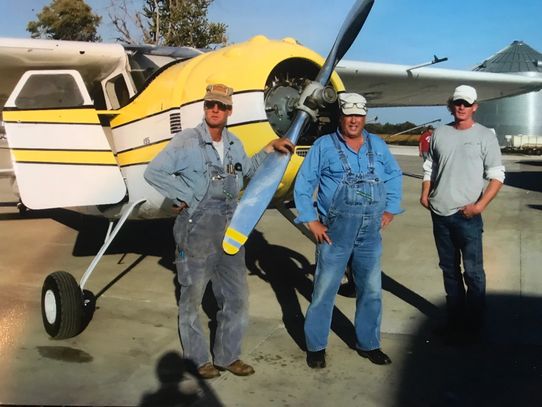Hours Mon-FRI 8am-2pm / Sat 7am-4pm / Sunday 7am-4pm
Kiman Kingsley
Kaland Kingsley
Kiman Kingsley

Manager of Operations
Kiman manages the overall operations for the farming and aviation side of the business. He stays quite busy, but still finds time to spray a few acres and take a ride in his hot air balloon.
Kaleb Kingsley
Kaland Kingsley
Kiman Kingsley

Manager of Operations
Kaleb takes care of the farming end of the business. So, if you're not busy flying, you better avoid him or you will find yourself driving a truck! Kaleb doesn't like to fly, but he has been known to skydive! Go figure.
Kaland Kingsley
Kaland Kingsley
Kaland Kingsley

Chief Pilot
Kaland stays busy flying and managing the other pilots. His knowledge of plant pests and diseases is well respected among local farmers. When not spraying, he enjoys flying his historic cub around the area.
The Kingsley's
4th Generation Farmers

STOTTS CITY, Mo. — For four generations, the Kingsley family has worked the rich farmland north of Stotts City. Now, they’re working the air, too.
“Kiman started flying just for the pleasure in 1989,” said Darlene Kingsley, of her husband’s long-time fascination with flying. “He got his two brothers to take it up, too. So they were all flying.”
They learned to fly small passenger planes at the Joplin Regional Airport, getting their private, instrument and commercial ratings.
“Then we talked about ways to work outside the farm,” Kiman Kingsley said, noting that the family works 2,000 acres near Stotts City. “We decided to try crop-dusting as a part-time thing.”
They bought their first plane in 2003 and paid for it that year. They bought their second plane in 2004 and paid for it that year. In 2005, they bought two planes and paid for them that year.
“The more planes you have, the more acreage you can do and the more you can make,” said Darlene Kingsley. “The need was so much greater than we dreamed.”
The “Flying Kingsleys” have dusted more than 60,000 acres since April — far more than they had dusted at this time last year.
The weather this year has been a factor. The ground was so wet this spring that farmers could not get their tractors into the fields to fertilize or spray for weeds and insects. But Kingsley’s planes could fly over the fields.
“What we do is emergency work. That’s generally what we get,” said Kiman Kingsley.
Often working from daylight to dusk, the Kingsleys spray pecan trees for weevils as far west as Chetopa, Kan. They fly north to Marshall to spray soybeans for Japanese beetles. They fly south to Crane to spray brush for a cattleman. Near Golden City, they dust 2,000 acres that produce Allen’s Green Beans. You might have seen them recently flying over corn near Granby.
Kiman Kingsley said he knew a lot of farmers in Southwest Missouri and Southeast Kansas when he started. He knows a lot more now, and many of them have helped him succeed because Kingsley helps them increase production during the growing season. That fattens the farmer’s wallet.
“Some farmers over near Asbury pulled together and built a small airstrip for me so I can spray all of their fields when I’m in that area,” he said. “They all get together and bring water and food to us for lunch. They’re taking care of us while we’re taking care of their crops.”
Darlene Kingsley said, “He loves to crop dust. He wanted me to try it. There is no way I was going to do that.”
Kiman Kingsley flies about four feet above the crop at a speed of 110 mph. He follows the lay of the land, floating over the ground as closely as he can. It’s total concentration. He can’t take his eyes off the ground in front of him for a second.
He has to keep an eye out for trees and power lines. The plane has sharp blades built into its design to cut power lines if the pilot should encounter them, but they don’t always prevent a crash. There are also features on the plane that are designed to reduce entanglements.
Kingsley’s closest call, so far, was over a farm near Golden City when a hose came loose and sprayed fungicide inside of the cockpit. Kingsley was wearing a helmet with a visor that protected his eyes. Had it been an insecticide and had he not been wearing a helmet, he would have been blinded and virtually unable to land.
Kingsley Field, a half-mile stretch of grass, has been created in a corn field not far from the Kingsley farmhouse. Taking off with so much liquid weight — about 1,000 pounds — requires careful planning. The height of the grass, whether its dry or not and the speed of the head wind can make a big difference on the take-off.
Kingsley uses the latest technology. A computer-satellite linkup keeps him on the right bearing when flying over a field so that he goes over a different 50-foot swath with each pass.
“It lines you up with no overlapping. It’s very precise,” he said. “It’s a $100,000 unit. I don’t know how the old guys did it by eye.”
Darlene Kingsley, who runs the office side, said their business is soaring. A new office and other buildings will be constructed soon at Kingsley Field. One of the brothers, Kevin Kingsley, has struck out on his own. The other brother, Kaland, flies, and the Kingsleys have brought on board a new pilot, David Baker, of Eudora, Ark.
“I can remember when flying was special. We used to say; ‘Oh wow, we’re getting to fly today!’ Now it’s, we’re going to work,” she said.
But one of the Kingsley brothers, Kaleb, wants no part of the flying.
“I haven’t got the stomach for it,” he said.
Article By Wally Kennedy
Copyright © 2023 Hangarkafe - All Rights Reserved.